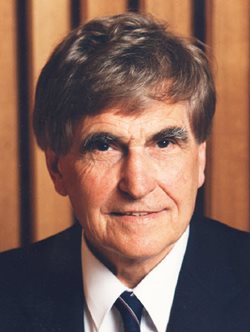Prepared by Professor Peter Lovibond FAPS
6 July 1918 – 24 July 2017
Syd Lovibond was one of the fathers of modern Australian psychology, although you wouldn’t guess it from his early history. Syd grew up in the Adelaide Hills and left school at age 13 to work in his father’s orchard. He trained and worked as an auto-mechanic before joining the RAAF – first as an aircraft mechanic and then as a pilot. After demobilising back to Adelaide at the end of World War II, Syd was awarded a university scholarship under the Commonwealth Reconstruction Training Scheme, having been assessed as having ‘conspicuous mental ability’. He obtained a Diploma in Social Sciences at the University of Adelaide and went on to complete a first class Honours degree in psychology at the University of Melbourne. Syd returned to the University of Adelaide in 1954 and became one of the founding members of their Department of Psychology. He obtained his PhD in that department in 1962. Syd was an enthusiastic proponent of the application of experimental psychology – particularly conditioning methods – to clinical problems such as enuresis, anxiety and addiction. He spent time at the Maudsley Hospital in London (1961-2) and Dalhousie University in Canada (1964-5). He was active in promoting behaviour therapy and evidence-based training and practice in psychology, and served as the fourth President of the Australian Psychological Society from 1968-9.
In 1969 Syd moved to Sydney to take up the position of Professor in the School of Psychology at the University of New South Wales (UNSW). Over the next 13 years he transformed the School into a highly research-active unit with particular strengths in behavioural neuroscience and clinical psychology. He introduced a new four-year Bachelor of Psychology degree and a two-year Master of Psychology degree that became the forerunners of training programs in the discipline and profession of psychology in Australia today. He carried out the first controlled trial of an intervention for alcohol dependence (discriminated aversion therapy) with an explicit goal of establishing controlled drinking rather than abstinence. He also studied the effect of alcohol on driving behaviour, the nature of fear and stress, driving as a skilled behaviour and the effect of guard training on prison behaviour. In collaboration with his son Peter he developed the Depression Anxiety Stress Scales (DASS), an instrument which has been translated into 40 languages, and is now one of the most widely used measures for discriminating between negative affective states. He was elected to Fellowship of the Academy of Social Sciences in Australia in 1974.
After retiring from UNSW in 1983, Syd remained active as an Emeritus Professor. He was Chair of the Scientific Committee for the XXIV International Congress of Psychology held in Sydney in 1988. He helped establish the National Drug & Alcohol Research Centre (NDARC) at UNSW in 1988, and he served on the NSW Government’s Corrective Services Council for 15 years. He completed a 22-year term on the APS Council in 1988, and was elected in that year as an Honorary Fellow of the APS. He went on to establish the Psychology Foundation of Australia, a consortium of psychology departments committed to promoting the scientific discipline of psychology and high standards of professional training and practice.
Syd was also an inventor developing a new form of cricket – compressible ball cricket – using a composite ball of the same weight as a standard cricket ball but with enough ‘give’ that it wouldn’t break the skull or shins of a batsman playing without a helmet or pads. He also developed a bat with chamfered edges to accelerate the pace of the game and increase the number of slip catches. The general idea was to allow young cricketers to learn cricket skills without fear of injury or the need for expensive protective equipment and yet maintain the excitement and tempo of the game.
During his career, Syd’s research featured in several television programs and he produced two films, Danger Level (1970) on the effect of alcohol on driving and Four More Days (1976) on his simulated prison research. He leaves a wonderful legacy of achievement in research, training and professional service. He supervised more than 30 PhD students, many of whom have taken up influential positions in Australian psychology. Syd will be remembered warmly by his students, friends and colleagues for his intellect, his unwavering commitment to psychology, his drive and enthusiasm, and his generosity of spirit.
Disclaimer: Published in InPsych on October 2017. The APS aims to ensure that information published in InPsych is current and accurate at the time of publication. Changes after publication may affect the accuracy of this information. Readers are responsible for ascertaining the currency and completeness of information they rely on, which is particularly important for government initiatives, legislation or best-practice principles which are open to amendment. The information provided in InPsych does not replace obtaining appropriate professional and/or legal advice.